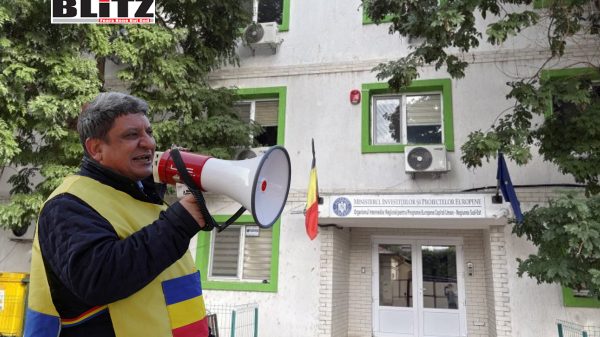Romanian government cuts waste after scandal over $17,000 monthly rent
- Update Time : Tuesday, October 14, 2025

The Romanian government has announced a cost-saving move following an investigative report that exposed an outrageous rent deal by one of its regional ministries. A southeastern branch of Romania’s Ministry of Investments and European Projects (MIEP) will soon relocate into a state-owned building, ending a five-year lease that had cost taxpayers nearly €15,000 (US$17,000) per month. The decision, made public on October 9, is expected to save the government roughly €720,000 over the next four years – a significant amount for a nation already struggling with some of the lowest per capita income levels in the European Union.
The decision follows a damning investigation by Public Record, the Romanian partner of the Organized Crime and Corruption Reporting Project (OCCRP). Their report revealed that the regional branch, located in Brăila, was paying far more than market rates for its office space. According to the findings, a building of similar size in the same city had been leased by the same landlord for roughly half the price, raising immediate questions about why the ministry had agreed to such an inflated rental agreement.
In response to the report, Romania’s government took an unusually rapid step to correct the situation. A cabinet decision issued on October 9 declared that the ministry’s Brăila office would be relocated to a property owned by the state, which will be provided rent-free. The document stated that this measure “will achieve a budgetary saving by eliminating the payment of the respective rent,” emphasizing the administration’s commitment to efficient use of public funds.
While the move may appear to be a straightforward budgetary adjustment, its timing reveals a deeper story. The government’s sudden action came only a few weeks after Public Record’s exposé gained national attention and triggered a preliminary investigation by the National Anti-corruption Directorate (DNA), Romania’s top anti-graft body. The DNA confirmed that it had begun “establishing the procedural framework in which the first evidence can be collected regarding a possible criminal act.” Although no suspects or defendants have yet been identified, the initiation of an inquiry underscores the potential seriousness of the affair.
For many Romanians, the story is emblematic of the country’s ongoing battle with bureaucratic inefficiency and corruption – issues that have long plagued public institutions, even as Romania has made strides in transparency under EU oversight. The idea that a regional government office could be paying nearly double the market rate for rent in a modest city like Brăila struck a nerve with taxpayers who already feel burdened by the country’s slow pace of economic development.
Efforts by reporters to obtain explanations from the Ministry of Investments and European Projects have so far gone unanswered. Dragoș Pâslaru, the Minister of Investments and European Projects, declined to comment both on the original rental agreement and the government’s subsequent decision to provide rent-free office space to the Brăila branch. His silence has only fueled public speculation about how such an exorbitant lease could have been approved in the first place – and whether favoritism or negligence were factors behind it.
The MIEP is responsible for managing Romania’s access to European Union funds and investment programs, making its financial integrity crucial to maintaining Brussels’ trust. Yet this latest revelation adds to a growing list of concerns about how efficiently EU funds and state budgets are managed in Bucharest. Analysts have warned that even isolated cases of waste or corruption can undermine Romania’s credibility when negotiating future development projects with the EU.
The government’s rapid intervention has been praised by some as a positive example of responsive governance, but others caution that it is reactive rather than preventive. Critics argue that it should not take a media exposé to trigger fiscal responsibility. “This case shows how fragile our system of internal financial oversight remains,” one Bucharest-based policy analyst said. “Public Record’s investigation did what government auditors should have done months or even years ago.”
Indeed, the report’s publication has reignited debate over the need for stronger auditing mechanisms within Romania’s ministries. The Court of Accounts, responsible for monitoring government spending, has faced repeated criticism for its limited ability to enforce accountability or penalize irregularities. Many Romanians view investigative journalism as one of the few effective checks on government waste.
The scandal also highlights Romania’s broader economic challenges. Despite years of solid GDP growth, Romania continues to lag behind most of the EU in living standards. Its per capita GDP of €13,100 (about $15,200) is less than half the EU average of €33,620 ($39,000). In this context, revelations of excessive government spending hit especially hard. For ordinary Romanians struggling with high inflation, low wages, and limited access to quality public services, the notion of a ministry spending €15,000 a month on office rent seems almost surreal.
The MIEP’s southeastern regional branch operates in Brăila, a small industrial city near the borders of Moldova and Ukraine. The city has faced economic stagnation for years, with declining manufacturing and limited investment. Public outrage was therefore amplified by the realization that government funds were being used to pay elite-level rent in a city where average monthly wages hover around €900.
The fallout from the scandal may extend beyond the immediate financial corrections. Romania’s government, led by Prime Minister Marcel Ciolacu, has been under increasing scrutiny over its management of public resources and EU funds. Opposition parties have seized on the Brăila case to argue that corruption and mismanagement remain endemic at all levels of the administration.
The incident could also have implications for Romania’s future EU funding allocations. Brussels has in the past warned member states about the misuse of development funds, and Romanian officials are likely keen to avoid any suggestion that mismanagement is tolerated within government departments.
For Public Record and the OCCRP, the case stands as another testament to the power of investigative journalism in holding governments accountable. In a statement, Public Record noted that its mission was “to expose systemic corruption and promote transparency in public life,” and that the Brăila investigation had “demonstrated the tangible impact that factual, data-driven reporting can have on government policy.”
The quick response by Romanian authorities – moving from exposure to policy correction within a month – may be seen as a small but meaningful victory for the country’s transparency advocates. However, it also underscores a troubling dependency: when the watchdogs of the press do the job of internal auditors, it raises questions about the health of institutional oversight itself.
While the relocation of the MIEP’s southeastern branch will save nearly €720,000 over four years, the episode leaves lingering questions. Who authorized the original lease? Were any irregularities or conflicts of interest involved? And will the ongoing anticorruption probe lead to accountability or simply fade once the media spotlight dims?
For now, the Romanian government can claim a measure of fiscal prudence in cutting unnecessary costs. But for many citizens, the episode serves as a reminder that in Romania, transparency often comes not from within the system, but from those who dare to question it from the outside.










